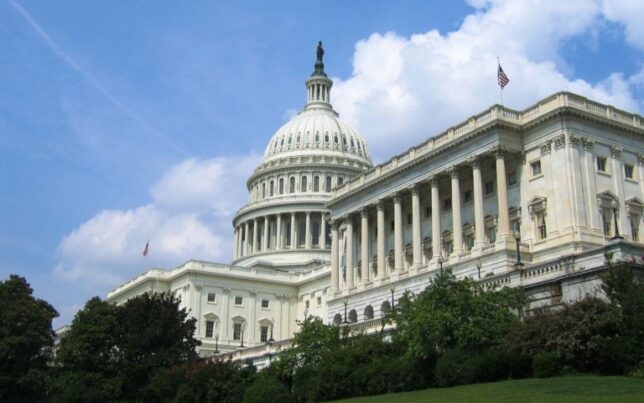Labor Watch
Legislation Against Politicization
 U.S. Capitol. License: Wikimedia Commons.
U.S. Capitol. License: Wikimedia Commons.

U.S. Rep. Scott Fitzgerald’s newly introduced STUDENT Act—the “Stopping Teachers Unions from Damaging Education Needs Today” Act—would, among other things, amend the National Education Association’s (NEA’s) federal charter to prohibit it from engaging in political activities and lobbying.
Congress granted the charter from which the NEA benefits in 1906. The union is a decidedly political actor, and the ’06 charter does not prevent it from being so. Some 60% of such federal charters do include such prohibitions, according to a Wall Street Journal op-ed yesterday by Fitzgerald and Aaron Withe.
Fitzgerald is a Republican from Wisconsin. Withe is president of the Freedom Foundation.
“Thankfully,” they write, the NEA’s ’06 charter’s “provisions aren’t chiseled in stone. Congress can repeal or revise federal charters when it deems necessary. The time has come to do so for the NEA.”
The “aren’t-chiseled-in-stone” language echoes a similar characterization by J. D. Vance in May 2021, before he was elected Ohio’s junior U.S. Senator last year. “[W]e should eliminate all special privileges that exist for our nonprofit and foundation class,” said Vance, a Republican, in a speech to the Claremont Institute. “The decision to give those foundations and those organizations special privileges is a decision made by public policy. It was made by man, and we can undo it.”
After the Rockefeller Foundation sought its own federal charter from Congress in 1910, great controversy ensued over what policymakers thought would be its overweening, non-democratically exercised power. Rockefeller withdrew the request and instead obtained a New York State charter in 1913.
As the NEA has benefitted from its federal charter, establishment philanthropy has benefitted from federal tax-incentivization that Congress made law—in this case, into the 1969 Tax Reform Act that basically still structures all of nonprofitdom. There is no Constitutional right to the tax benefits, though the government cannot impose any unconstitutional condition on a benefit. The government could not, for example, condition a benefit on the waiver in return of a recipient’s free-speech rights.
A non-tax-incentivized foundation would still have free-speech rights; they just wouldn’t be tax-incentivized—or, some would say, subsidized.
The ’69 law, of course, already prohibits groups tax-exempt charities from engaging in politics. Its distinction between charity and politics, though, is considered by many to have become something of a joke—much as many would see the NEA charter’s charge that the union promote “the cause of education in the United States.”
Whether any serious, STUDENT Act-like legislative attempt to strengthen or even just clarify nonprofit law’s distinction between charity and politics would constitute 1.) a right-waiving unconstitutional condition on a benefit or 2.) a mere refusal to subsidize the exercise of a right is a question that sure seems likely to arise during the coming years.
This article originally appeared in the Giving Review on June 29, 2023.



